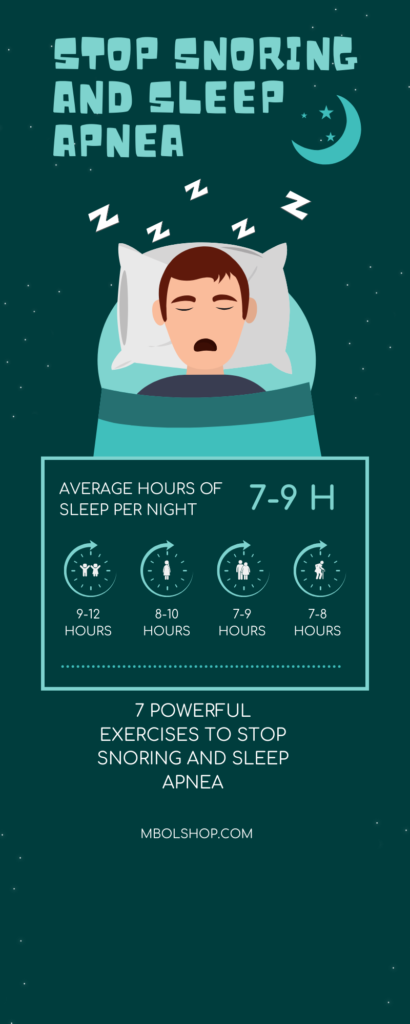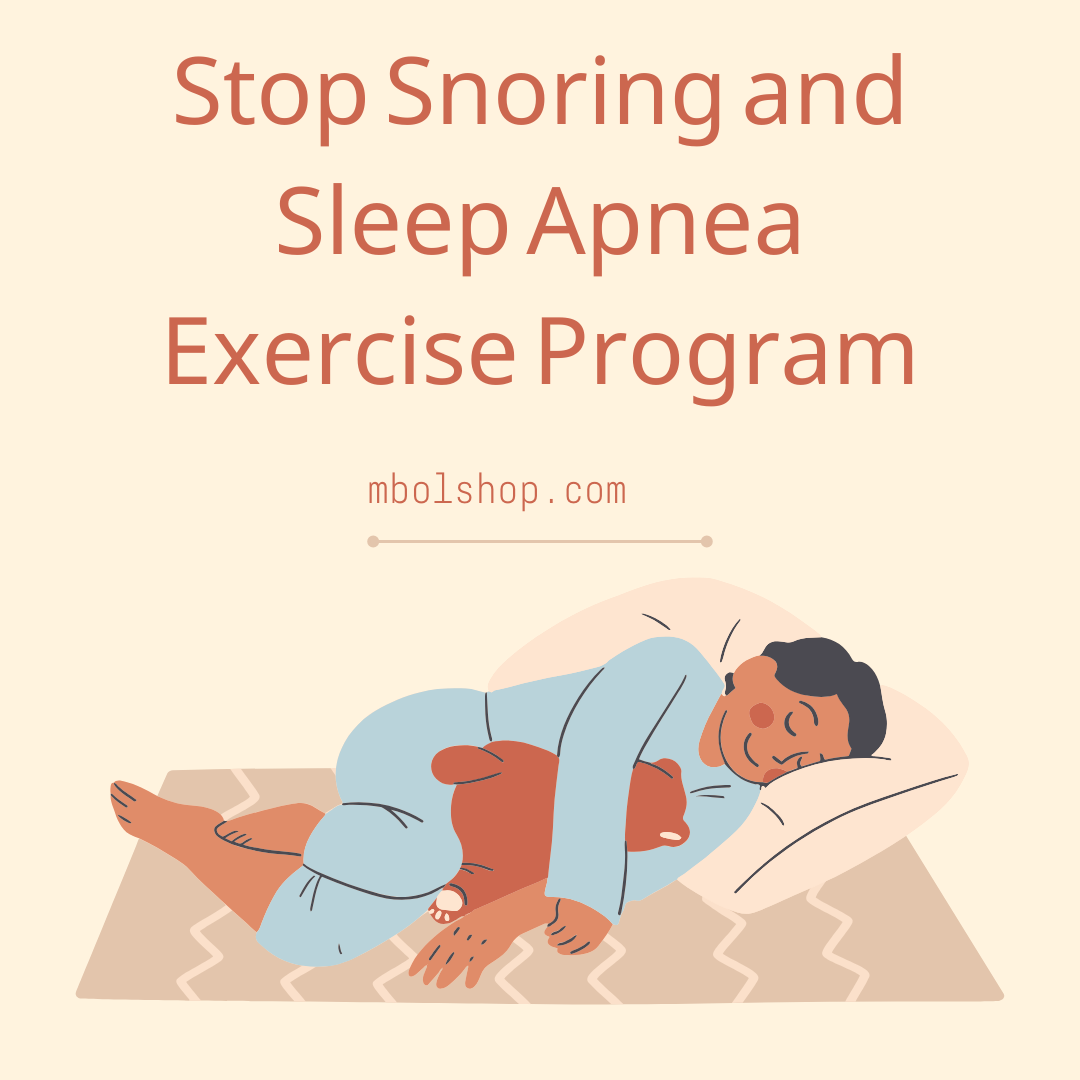Discover effective exercises to combat snoring and sleep apnea. Learn how the Stop Snoring and Sleep Apnea Exercise Program can help you achieve a peaceful night’s sleep.
Table of Contents
Are you tired of disrupted sleep due to snoring or sleep apnea? You’re not alone. These sleep disorders can not only affect your own rest but also disrupt the sleep of those around you. Fortunately, there’s a natural solution that doesn’t involve invasive treatments or costly devices: the Stop Snoring and Sleep Apnea Exercise Program.
Understanding the Issue
Before delving into the exercises, let’s understand why snoring and sleep apnea occur. Snoring happens when the flow of air through the mouth and nose is partially obstructed during sleep, causing vibrations in the throat tissues. On the other hand, sleep apnea is characterized by pauses in breathing or shallow breaths during sleep, often leading to fragmented sleep patterns and daytime fatigue.
The Solution: Exercise Program
The Stop Snoring and Sleep Apnea Exercise Program offers a holistic approach to addressing these issues. By incorporating targeted exercises into your daily routine, you can strengthen the muscles in your throat and mouth, reducing the likelihood of airway obstruction and improving airflow during sleep.
Stop Snoring and Sleep Apnea
1. Tongue Strengthening Exercises
One effective exercise involves pressing the tongue against the roof of the mouth and sliding it backward. This helps strengthen the muscles in the tongue and throat, reducing the chances of the tongue collapsing backward and obstructing the airway.
2. Jaw Opening and Closing Exercises
Exercises that involve opening and closing the jaw can help strengthen the muscles in the jaw and throat, preventing them from relaxing excessively during sleep. Simply opening and closing your mouth while keeping the tongue in a neutral position can be beneficial.
3. Throat and Palate Strengthening Exercises
Targeting the muscles in the throat and palate can also help alleviate snoring and sleep apnea. One effective exercise is pronouncing vowel sounds repeatedly, exaggerating the movement of the tongue and throat muscles.
4. Breathing Exercises
Practice deep breathing exercises to improve overall lung capacity and strengthen respiratory muscles. This can help ensure a steady flow of oxygen during sleep, reducing the likelihood of breathing interruptions.
5. Facial Muscle Exercises
Exercises that target the muscles in the face and neck can also contribute to reducing snoring and sleep apnea symptoms. For example, performing facial yoga poses can help tone and tighten these muscles, promoting better airflow.
6. Neck Strengthening Exercises
A strong neck can help keep the airway open during sleep. Incorporate exercises such as neck rotations and neck stretches into your routine to strengthen these muscles.
7. Posture Correction Exercises
Poor posture can contribute to airway obstruction during sleep. Practice exercises to improve posture, such as shoulder rolls and chest stretches, to ensure optimal airflow.
Conclusion
The Stop Snoring and Sleep Apnea Exercise Program offers a natural and effective solution for those struggling with these sleep disorders. By committing to a regular exercise routine targeting the muscles involved in breathing and airway function, you can significantly reduce snoring and sleep apnea symptoms, leading to better sleep quality and overall well-being.
For more information on the Stop Snoring and Sleep Apnea Exercise Program, visit Here..
Remember, consistency is key when it comes to seeing results from these exercises. Incorporate them into your daily routine and experience the benefits of improved sleep and overall health.

Additional Tips for Success
In addition to incorporating the exercises mentioned above into your daily routine, here are some additional tips to enhance the effectiveness of the Stop Snoring and Sleep Apnea Exercise Program:
1. Stay Hydrated
Dehydration can contribute to nasal congestion and throat dryness, which may exacerbate snoring and sleep apnea. Make sure to drink plenty of water throughout the day to keep your airways moist and clear.
2. Maintain a Healthy Weight
Excess weight can put pressure on your airway, increasing the likelihood of obstruction during sleep. By maintaining a healthy weight through proper diet and regular exercise, you can reduce the severity of snoring and sleep apnea symptoms.
3. Avoid Alcohol and Sedatives Before Bed
Alcohol and sedatives can relax the muscles in your throat and tongue, leading to increased snoring and potential breathing disruptions. Avoid consuming these substances before bedtime to ensure a more restful sleep.
4. Establish a Consistent Sleep Schedule
Irregular sleep patterns can disrupt your body’s natural sleep cycle and contribute to snoring and sleep apnea. Aim to go to bed and wake up at the same time each day to establish a consistent sleep schedule.
5. Elevate Your Head While Sleeping
Using a firm pillow to elevate your head while sleeping can help alleviate snoring by reducing the likelihood of airway obstruction. Experiment with different pillow heights to find the most comfortable position for you.
6. Practice Good Sleep Hygiene
Create a relaxing bedtime routine to signal to your body that it’s time to wind down. This may include activities such as reading, meditating, or taking a warm bath. Avoid screens and stimulating activities before bed to promote better sleep quality.
Final Thoughts
The Stop Snoring and Sleep Apnea Exercise Program offers a natural and sustainable solution for improving sleep quality and reducing the symptoms of snoring and sleep apnea. By incorporating targeted exercises, adopting healthy lifestyle habits, and practicing good sleep hygiene, you can achieve a restful night’s sleep and wake up feeling refreshed and rejuvenated.
For more personalized guidance on managing snoring and sleep apnea, consult with a healthcare professional or sleep specialist. Remember, making small changes to your daily habits can have a significant impact on your sleep quality and overall well-being.
Invest in your sleep health today and experience the transformative benefits of a peaceful night’s sleep with the Stop Snoring and Sleep Apnea Exercise Program.




